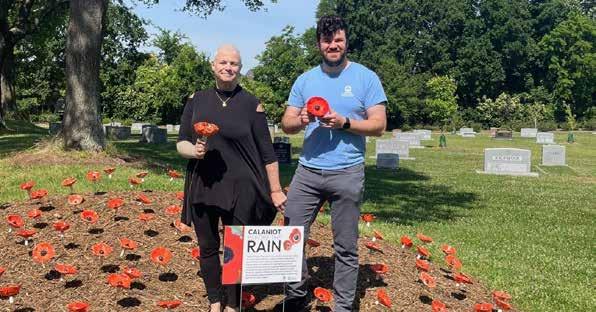
5 minute read
Calaniot Memorial Finds Final Home at Hebrew Cemetery
August 2024
By Sandra Goldman, Hebrew Cemetery Executive Director
The Calaniot ceramic flowers, a poignant tribute to the victims of the atrocities on October 7 in Israel, have found their final exhibit space at the Hebrew Cemetery. This installation marks the culmination of a community-wide project that began in early 2024, reflecting the Charlotte Jewish community's solidarity with Israel and its people.
The Calanit, also known as the red anemone, is Israel's national flower. Blooming during winter, these little red flowers symbolize life and resiliency, carpeting the landscape for miles in Israel's south and inspiring the annual Darom Adom (Red South) Festival. In the wake of the October 7 attack and subsequent war, a group of Israeli ceramic artists initiated a global project to create 100,000 clay Calaniot in memory of the victims.
Responding to this call, Jewish Federation of Greater Charlotte and the Levine Jewish Community Center (Levine JCC) organized Calaniot ceramic workshops throughout January and February 2024, coinciding with the peak season for the red anemone flower bloom in Israel. More than 200 community members participated in these workshops, creating the flowers that initially formed the “Calaniot Before the Rain” art installation in front of the entrance to the main building at Shalom Park.
Now, these community-crafted Calaniot have found their permanent home at the Hebrew Cemetery, a choice of location that imbues the exhibition with deep significance. Cemeteries, as sanctuaries of remembrance and reflection, provide a solemn backdrop that honors the memory of those lost. The Hebrew Cemetery, with its historical and cultural resonance, deepens this act of commemoration, linking the present tragedy to a broader narrative of endurance and remembrance.
The beauty of the Calaniot ceramic flowers stands in stark contrast to the violence they memorialize, inviting visitors to reflect on the fragility of life and the enduring impact of loss. The serene environment of the cemetery fosters a space for quiet contemplation, allowing individuals to process their grief and pay respects in a meaningful way.
Furthermore, the cemetery setting facilitates community healing. As a place where people traditionally gather to mourn and remember, these holy grounds foster a sense of solidarity and shared humanity. The Calaniot thus transform the Hebrew Cemetery into a living memorial, a testament to resilience and the enduring power of memory.
Tamir Avraham, a native of Israel who experienced the attacks in his hometown of Ofakim, near the Gaza border, shares his perspective: “Every year, at the end of January through February, in the South of Israel where I was born, the red Calaniot bloom and beautifully cover the land, almost creating a red-carpet effect. For us, the blooming of Calaniot is a symbol of renewal and majesty of HaShem's work. This year, the blooming season once again arrived with a feeling of hope and trust that everything will renew for good. That's the perpetual renewal of nature. After October 7, our land was covered with the blood of our brothers and sisters. Red Calaniot have always survived adversity and the hostile weather, but also this year, reminded us of all of those who perished in the south of Israel and cannot see their blooming anymore. Nevertheless, seeing the beauty of their velvet red amidst the tanks and bombs, invites us to thrive, to keep fighting for life as those who survived the attack have done it as well. Also, to have compassion for each other and appreciate life even more. Calaniot are a symbol of resilience for all Israelis and us as Jews. Having these ceramic flowers in our Hebrew Cemetery is a precious gift. They will remind us of not only the cycle of life but also to have hope and faith that our hostages will come back home and our land will be in peace. We will renew, and we will be strong to bloom and prosper as a nation: Am Yisrael Chai!”
The journey of these Calaniot, from their creation by community members to their final resting place at the Hebrew Cemetery, embodies the project's goal of healing and remembrance. Michelle Rusgo, director of art and culture at the Levine JCC, reflects on the project's impact and culmination: "It has been moving to see everyone come together to create these flowers. Art is a great vessel for healing. After making donations, people were still wondering what they could do. There was a strong pull to connect with one another and to heal together. This project has been a wonderful way for our community to do that."
Rusgo continues, “It is very befitting for the Calaniot to find their final resting place at the Hebrew Cemetery. These beautiful flowers, created by the Charlotte community, will forever memorialize the atrocities of October 7 and the resilience of the Jewish people.”
The Board of Directors of the Hebrew Cemetery is proud to have collaborated with Jewish Federation of Greater Charlotte and the Levine JCC to display these clay flowers in the peaceful meadows of our cemetery. The exhibition leverages the unique emotional, cultural, and historical significance of the location and creates a powerful and poignant tribute to the victims of the October 7 atrocities.
As the clay Calaniot stand as a testament to resilience and unity, they also serve as a reminder of the enduring connection among communities worldwide. This living memorial in the Hebrew Cemetery not only honors those lost but also celebrates the strength and solidarity of the Jewish community in Charlotte and beyond.











